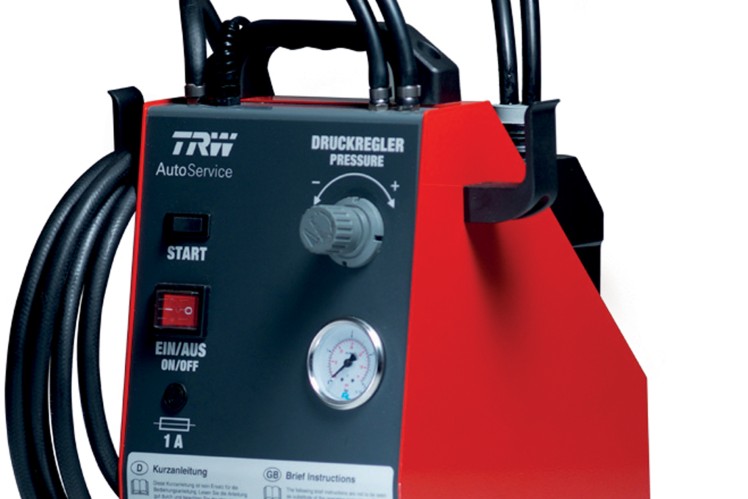ZF Aftermarket: Why is changing the brake fluid so important? - The consistency of brake fluid changes over time
- Water ingress can create bubbles
- ZF Aftermarket advises a yearly fluid oil change
High-quality brake fluid is crucial in ensuring that the brakes can function properly. This is why the experts at ZF Aftermarket recommend that their workshop partners regularly remind their customers to drop in and have their brake fluid changed. Regardless of how many miles the vehicle has run, it's wise to change the fluid every year.

Brake fluid plays an important role in ensuring that the brake system runs smoothly and therefore in maintaining driving safety. As the consistency of the brake fluid change over time, it is necessary to change the fluid regularly as otherwise brake force could deteriorate or, in a worst-case scenario, the brakes could fail. Thankfully, this task doesn't take much time or effort; the amount of brake fluid simply has to be measured and refilled if necessary. The ZF Aftermarket experts have helpful tips on how to check the current condition of the brake fluid quickly and reliably. With these, workshops can offer their customers a wider range of services and thus contribute to a persuasive increase in safety.
Severe overheating can lead to total failure
The brake fluid is in lines and tubes situated and connects the brake pedal with the pistons of the disc brake or the foundation brake cylinders of the drum brake. The fluid serves to transmit the pressure whenever the brake is pressed. A brake booster further supports this process.
Various influences can greatly affect the condition of the liquid over time. Therefore, severe overheating while applying the brakes over an extended gradient can cause the boiling point of the liquid to be exceeded. The result is an evaporative reaction. This in turn can lead to the formation of bubbles. When the pedal is then pressed once more, the air bubbles are compressed, but the force is hardly transmitted or not transmitted at all. The lack of power transmission ultimately leads to a brake failure.
A reason for a faulty braking effect can be ingress of water into the brake circuit. The weak point here is often the ventilation hole in the cover of the tank. This provides the necessary atmospheric ventilation in the event of fluctuating brake fluid levels. However, atmospheric humidity can also enter in this ventilation hole. In addition, water can make its way into the overrun tank through the ventilation when the engine or the vehicle is cleaned. The brake hoses and sealing elements can also be responsible for increased water content in the brake fluid, as water can diffuse through them.
Venting device for a reliable repair result
On average, brake fluids have a water content level of around 0.05 per cent. This value can increase significantly over the years. If the water content exceeds 3.5 per cent, we urgently advise that the fluid must be changed as the wet boiling point has been reached. When the 3 per cent mark is exceeded, the boiling point of the fluid drops to between 140 and 180°C. If an appropriate venting device is used, swapping out the fluid is very easy. To achieve this, ZF Aftermarket offers special versions that can be used to professionally ventilate around 90 per cent of all vehicles registered on the European market.
ZF Aftermarket offers a broad portfolio of TRW brake fluids which covers most vehicle types. TRW brake fluids ensure perfect braking behavior from -50°C to +50°C, offer optimal protection against corrosion and react quickly to the system sensors installed in the latest brake systems, such as ESP.
- The consistency of brake fluid changes over time
- Water ingress can create bubbles
- ZF Aftermarket advises a yearly fluid oil change
High-quality brake fluid is crucial in ensuring that the brakes can function properly. This is why the experts at ZF Aftermarket recommend that their workshop partners regularly remind their customers to drop in and have their brake fluid changed. Regardless of how many miles the vehicle has run, it's wise to change the fluid every year.

Brake fluid plays an important role in ensuring that the brake system runs smoothly and therefore in maintaining driving safety. As the consistency of the brake fluid change over time, it is necessary to change the fluid regularly as otherwise brake force could deteriorate or, in a worst-case scenario, the brakes could fail. Thankfully, this task doesn't take much time or effort; the amount of brake fluid simply has to be measured and refilled if necessary. The ZF Aftermarket experts have helpful tips on how to check the current condition of the brake fluid quickly and reliably. With these, workshops can offer their customers a wider range of services and thus contribute to a persuasive increase in safety.
Severe overheating can lead to total failure
The brake fluid is in lines and tubes situated and connects the brake pedal with the pistons of the disc brake or the foundation brake cylinders of the drum brake. The fluid serves to transmit the pressure whenever the brake is pressed. A brake booster further supports this process.
Various influences can greatly affect the condition of the liquid over time. Therefore, severe overheating while applying the brakes over an extended gradient can cause the boiling point of the liquid to be exceeded. The result is an evaporative reaction. This in turn can lead to the formation of bubbles. When the pedal is then pressed once more, the air bubbles are compressed, but the force is hardly transmitted or not transmitted at all. The lack of power transmission ultimately leads to a brake failure.
A reason for a faulty braking effect can be ingress of water into the brake circuit. The weak point here is often the ventilation hole in the cover of the tank. This provides the necessary atmospheric ventilation in the event of fluctuating brake fluid levels. However, atmospheric humidity can also enter in this ventilation hole. In addition, water can make its way into the overrun tank through the ventilation when the engine or the vehicle is cleaned. The brake hoses and sealing elements can also be responsible for increased water content in the brake fluid, as water can diffuse through them.
Venting device for a reliable repair result
On average, brake fluids have a water content level of around 0.05 per cent. This value can increase significantly over the years. If the water content exceeds 3.5 per cent, we urgently advise that the fluid must be changed as the wet boiling point has been reached. When the 3 per cent mark is exceeded, the boiling point of the fluid drops to between 140 and 180°C. If an appropriate venting device is used, swapping out the fluid is very easy. To achieve this, ZF Aftermarket offers special versions that can be used to professionally ventilate around 90 per cent of all vehicles registered on the European market.
ZF Aftermarket offers a broad portfolio of TRW brake fluids which covers most vehicle types. TRW brake fluids ensure perfect braking behavior from -50°C to +50°C, offer optimal protection against corrosion and react quickly to the system sensors installed in the latest brake systems, such as ESP.
MEDIA
CONTACT

Fabiola Wagner

